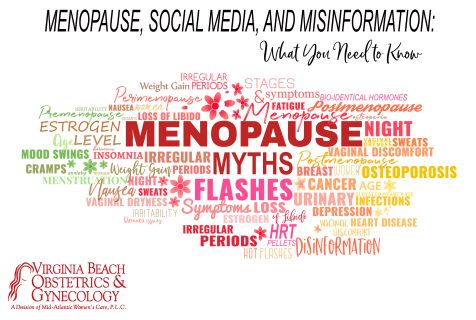
At Virginia Beach Obstetrics & Gynecology, we know that many of our patients turn to social media for information about menopause. While some of what you’ll find online is accurate, much of it is misleading—or even unsafe. A recent article in the Journal of Obstetrics & Gynecology highlights the challenges of online misinformation and unregulated products in menopause care. We would like to share key takeaways with you and address some common misconceptions.
Myth #1: “Bioidentical” and “Plant-Based” Hormones Are Always Safer
You may see ads claiming that “bioidentical” or “plant-based” hormones are more natural and therefore safer. In reality, bioidentical hormones simply mean hormones that are chemically identical to those made by your body—like estradiol and progesterone. Many FDA-approved medications already use these hormones. The term “plant-based” is mostly a marketing phrase; while soybeans may be the starting material, the final product is synthesized in a lab. These labels do not guarantee added safety.
Myth #2: Compounded Hormones Are Better Because They’re “Customized”
Compounded hormones are made in special pharmacies when a patient needs a formulation that isn’t otherwise available (for example, due to an allergy). Unfortunately, compounded hormone therapy is often marketed broadly as “safer” or “more effective.” This is not supported by scientific studies. In fact, compounded products have fewer safety checks, inconsistent dosing, and lack the warning labels required for FDA-approved medications.
Myth #3: Hormone Pellets Are a Reliable Option
Hormone pellets are small implants placed under the skin to deliver estrogen or testosterone. The FDA has reported thousands of adverse events from pellet use, including blood clots, strokes, heart attacks, and cancers. Side effects such as hair loss, acne, and abnormal bleeding are also more common compared with standard therapies, and if you experience a side effect, you may suffer with the effects for months. With other therapies, such as oral medications, creams, and patches, the solution is to simply stop using the medication or wearing the patch, and the side effects will subside. Once pellets are inserted, they cannot be removed, and hormone levels can remain abnormally high for months. It may take up to 9 months or longer for hormones to return to pre-pellet levels; in fact, one scientific review shows that the median return to pre-treatment estrodiol levels after two pellet implants was 311 days.
Myth #4: Estrogen Creams for the Face or Body Stop Aging Safely
Some social media influencers promote estrogen creams as “anti-aging” products for skin. While tiny studies suggest possible changes in skin texture, there are no large, long-term safety studies. Because these creams may be absorbed into the bloodstream, using them outside of approved medical indications could increase risks without proven benefit.
Myth #5: Supplements Are Safe Because They’re “Natural”
Menopause supplements are heavily promoted online, sometimes even by physicians or celebrities who profit from sales. Unlike prescription medications, supplements are not FDA-approved and may contain incorrect doses—or even dangerous contaminants. Some, such as black cohosh or green tea extract, have been linked to serious liver injury. If you choose to use supplements, always look for third-party verification seals such as USP Verified or NSF Certified.
Myth #6: At-Home Hormone Testing Can Guide Menopause Care
Urine tests that claim to diagnose menopause, predict its timing, or guide hormone therapy are being sold directly to consumers. These tests are not scientifically validated and should not be used to make treatment decisions. Menopause is a clinical diagnosis made by your physician based on your symptoms and health history.
What You Can Trust
- FDA-approved medications have been studied for safety and effectiveness.
- Bioidentical estradiol and progesterone are available in many safe, approved forms.
- Supplements and compounded products should only be used with caution and medical guidance.
- Your healthcare team is your best resource for evidence-based menopause care.
Our Commitment to You
At Virginia Beach OB/GYN, we are committed to listening to your concerns, debunking confusing information, and helping you choose safe, effective treatments. If you’ve seen a product or post online and have questions, bring it up at your appointment—we are here to help you sort fact from fiction.
